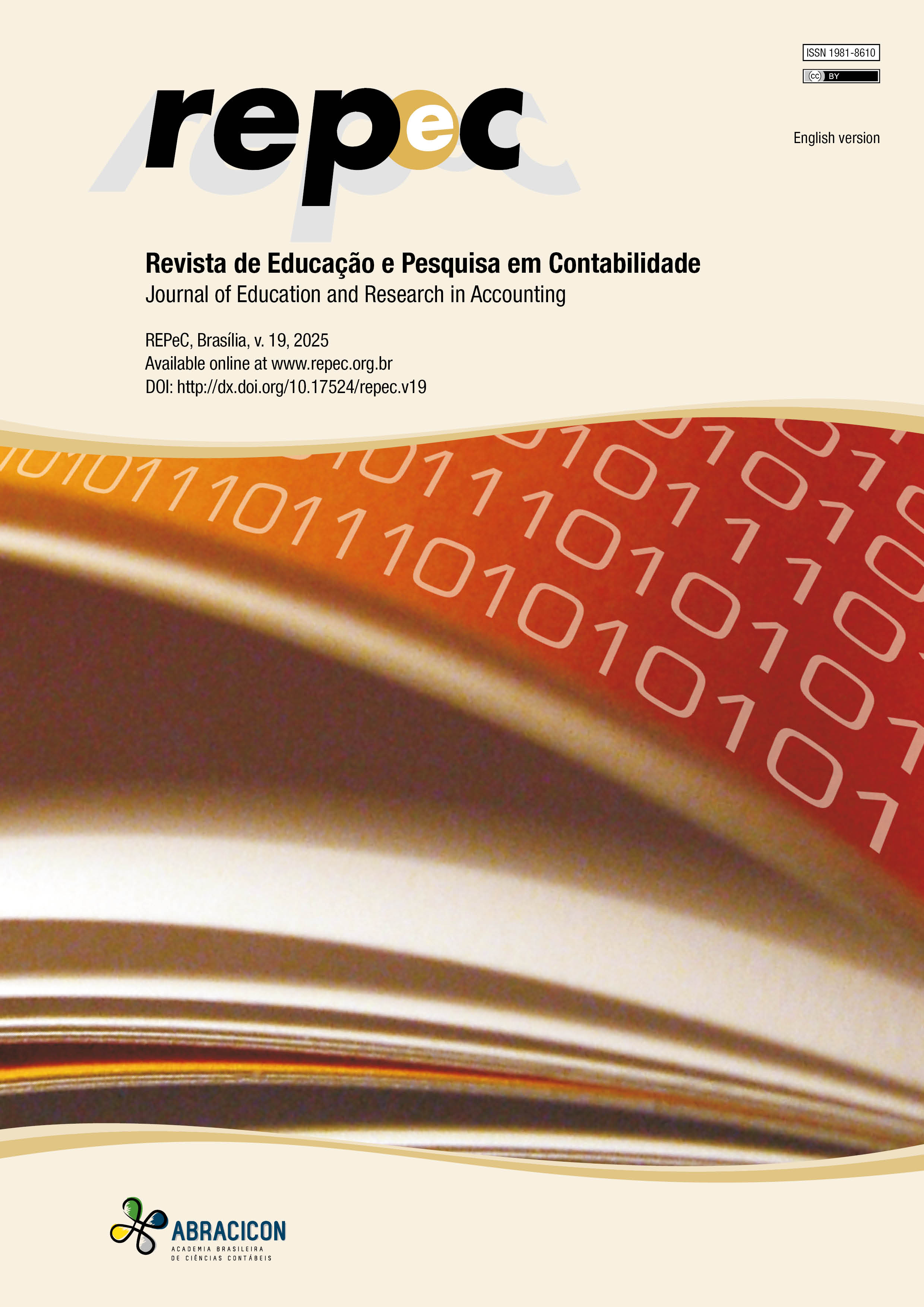The Potential of Partial Least Squares Structural Equation Modeling (PLS-SEM) with a Formative Approach in Accounting Research
DOI:
https://doi.org/10.17524/repec.v19.e3679Palavras-chave:
Equações Estruturais, Abordagem Formativa, Pesquisa em ContabilidadeResumo
Accounting research faces methodological challenges when investigating complex phenomena, often modeled by interrelated latent variables. In this context, Partial Least Squares Structural Equation Modeling (PLS-SEM) emerges as a robust alternative to multiple regression, particularly for modeling formative constructs. Unlike traditional methods, PLS-SEM allows for the simultaneous estimation of direct, indirect (mediated), and moderated relationships, making it especially useful for analyzing documentary and secondary data, which are commonly used in financial accounting. Therefore, this editorial explores the potential of the PLS-SEM formative approach in accounting research, highlighting applications in corporate governance, audit quality, organizational sustainability, and operational efficiency. The use of second-order constructs is discussed as a solution for capturing the complexity of these phenomena. Additionally, the relevance of PLS-SEM is underscored in the analysis of mediating and moderating effects, which are challenging to assess through traditional regression methods. By enabling more comprehensive and detailed analyses, PLS-SEM provides statistically robust models and greater precision in interpreting results. This article contributes to the literature by demonstrating the technique’s applicability and encouraging its adoption in accounting research.
Tradução
Referências
Burke, Q. L., & Wieland, M. M. (2017). Value relevance of banks' cash flows from operations. Advances in accounting, 39, 60-78. https://doi.org/10.1016/j.adiac.2017.08.002
Diamantopoulos, A., & Winklhofer, H. M. (2001). Index construction with formative indicators: An alterna-tive to scale development. Journal of Marketing Research, 38, 269-277. https://doi.org/10.1509/jmkr.38.2.269.18845
Fitriana, T., Wulandari, A., & Kompyurini, N. (2022). Behavioral Aspects and Their Effect on The Implementation Of The Regional Financial Accounting System Of Bojonegoro Regency. Journal of Governance, Taxation and Auditing, 1(1), 28-38. https://doi.org/10.38142/jogta.v1i1.390
Gujarati, D. N., & Porter, D. C. (2011). Basic Econometrics (5th ed.). McGraw Hill Education.
Habib, A. (2004). Impact of earnings management on value‐relevance of accounting information: empirical evidence from Japan. Managerial Finance, 30(11), 1-15. https://doi.org/10.1108/03074350410769344
Hair, J. F., Black, W. C., Babin, B. J., Anderson, R. E., & Tatham, R. L. (2009). Multivariate Data Analysis (7th ed.). Pearson Prentice Hall.
Hair, J. F., Ringle, C. M., & Sarstedt, M. (2011). PLS-SEM: Indeed a silver bullet. Journal of Marketing Theory and Practice, 19(2), 139-152. https://doi.org/10.2753/MTP1069-6679190202
Henri, J.-F. (2007). Management control systems and strategy: A resource-based perspective. Accounting, Organizations and Society, 31(6), 529-558. https://doi.org/10.1016/j.aos.2005.07.001
Lee, P. A., Fayard, D., & Robinson, G. (2011). The practical guide to PLS path modeling. Behavioral Research in Accounting, 23(1), 147-175. https://doi.org/10.1016/j.accinf.2011.05.002
Mason, J., & Levy, P. (2001). Developing structural models in BAR research. Behavioral Accounting Research, 13(2), 23-39. https://doi.org/10.2308/bria.2011.23.1.1
Nascimento, J. C. H. B., & da Silva Macedo, M. A. S. (2016). Modelagem de Equações Estruturais com Mínimos Quadrados Parciais: um Exemplo da Aplicação do SmartPLS® em Pesquisas em Contabilidade. Revista de Educação e Pesquisa em Contabilidade (REPEC), 10(3). https://doi.org/10.17524/repec.v10i3.1376
Nascimento, J. C. H. B., Angotti, M., Macedo, M. A. S., & Bortolon, P. M. (2018). As relações entre governança corporativa, risco e endividamento e suas influências no desempenho financeiro e no valor de mercado de empresas brasileiras. Advances in Scientific and Applied Accounting, 166-185. https://doi.org/10.14392/ASAA.2018110109
Putra, H. G., Anita, L., & Helmy, H. (2023). The Effect of Accountability, Transparency, and Public Participation on the Performance of Public Service Organizations (Empirical Study on Investment Board and Integrated Licensing Services in West Pasaman Regency). Siber Journal of Advanced Multidisciplinary, 1(1), 35-43. https://doi.org/10.38035/sjam.v1i1.15
Qatawneh, A. M. (2023). The role of organizational culture in supporting better accounting information systems outcomes. Cogent Economics & Finance, 11(1), 2164669. https://doi.org/10.1080/23322039.2022.2164669
Shahzad, F., Rehman, I. U., Hanif, W., Asim, G. A., & Baig, M. H. (2019). The influence of financial reporting quality and audit quality on investment efficiency: Evidence from Pakistan. International Journal of Accounting & Information Management, 27(4), 600-614. https://doi.org/10.1108/IJAIM-08-2018-0097
Smith, E. (2014). Multivariate statistics for social sciences: Current challenges and solutions. Journal of Statistical Applications, 5(3), 34-46.
Smith, M., & Langfield-Smith, K. (2004). Structural Equation Modeling in Management Accounting Research. Management Accounting Review, 15(1), 45-63.
Suseno, B. D., Sugianto, E., Purnamasari, E., & Supriadi, A. (2023). Analysis of the Application of Operational Management in Manufacturing Companies in Bandung City: The Effect of Production Efficiency, Product Innovation, and Customer Satisfaction on Financial Performance. West Science Journal Economic and Entrepreneurship, 1(11), 535-546. https://doi.org/10.58812/wsjee.v1i11.354
Zhou, G., Liu, L., & Luo, S. (2022). Sustainable development, ESG performance and company market value: Mediating effect of financial performance. Business Strategy and the Environment, 31(7), 3371-3387. https://doi.org/10.1002/bse.3089
Downloads
Publicado
Como Citar
Edição
Seção
Licença
Copyright (c) 2025 Revista de Educação e Pesquisa em Contabilidade (REPeC)

Este trabalho está licenciado sob uma licença Creative Commons Attribution 4.0 International License.
Autores que publicam nesta revista concordam com os seguintes termos:
a) Autores mantém os direitos autorais e concedem à revista o direito de primeira publicação, com o trabalho simultaneamente licenciado sob a Licença Creative Commons Attribution 3.0 Unported License, que permite o compartilhamento do trabalho com reconhecimento da autoria e publicação inicial nesta revista. Esta licença permite que outros distribuam, remixem, adaptem ou criem obras derivadas, mesmo que para uso com fins comerciais, contanto que seja dado crédito pela criação original.
b) Não cabe aos autores compensação financeira a qualquer título, por artigos ou resenhas publicados na REPeC.
c) Os artigos e resenhas publicados na REPeC são de responsabilidade exclusiva dos autores.
d) Após sua aprovação, os autores serão identificados em cada artigo, devendo informar à REPeC sua instituição de ensino/pesquisa de vínculo e seu endereço completo.

